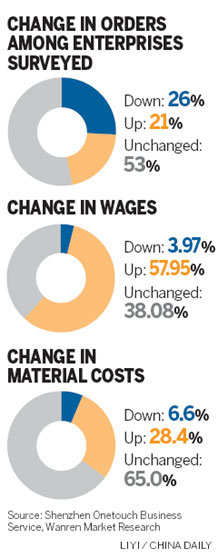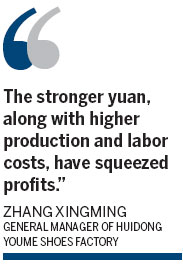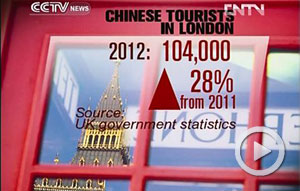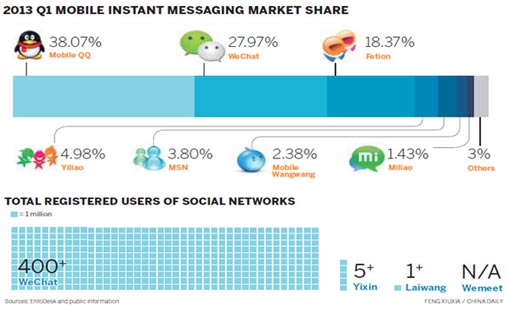Funds shortage blocks Delta trade: Report
Updated: 2013-10-11 07:46
Lack of financing has become a major factor affecting small and medium-sized enterprises, according to a report on foreign trade conditions in the Pearl River Delta, a manufacturing and export hub.
According to a report by Shenzhen Onetouch Business Service and Shenzhen-based Wanren Market Research, which was released on Thursday, more than 70 percent of SMEs in the region have encountered a shortage of funds in the past nine months.
The average monthly shortfall was 675,500 yuan ($110,400), according to the report.
The researchers sampled 1,302 companies in the delta region in the third quarter.
Nearly 30 percent of the respondents expect worsening financial shortages, according to the report.
"Given current fluctuations in exchange rates, an improved financial services system will help SMEs better cope with the business downturn," said Zheng Qun, a senior analyst at Shenzhen Onetouch.
According to the report, nearly 80 percent of companies didn't see any increase of orders in the first half. About 30 percent of SMEs saw a sharp drop in orders in recent months.
"A growing number of enterprises are eager to obtain financing to upgrade their equipment, invest in research and development, buy raw materials and undertake promotion," Zheng said.
Zhang Xingming, general manager of Huidong Youme Shoes Factory, said his company had to pass up some orders due to financial shortfalls in the first half.
"As a small company, financial organizations are often unwilling to lend to us. We had to rely on some forms of trade financing - for example, letters of credit from other companies - to keep our business running," he said.

The factory, located in Huizhou in the Pearl River Delta, exported some $800,000 worth of shoes in 2012, according to Zhang.
"The stronger yuan, along with higher production and labor costs, have squeezed profits," Zhang told China Daily.
The average production cost of a pair of shoes has increased about 30 percent this year, Zhang said.
"We hope for some efficient financial measures to support business growth. Small enterprises like ours are eager to hedge our risks, given the global trade situation," Zhang said.
The report indicated that the stronger yuan and weak global demand have affected Chinese exporters in recent months.
More than 78 percent of the SMEs sampled said that the yuan's appreciation had become a major factor affecting their business.
"The rising value of the yuan has forced some companies to give up overseas orders and profits are squeezed," said Xiao Feng, deputy general manager of Shenzhen Onetouch.
According to the report, some 20 percent of sampled companies had given up overseas orders due to the rising value of the yuan.
However, Xiao predicted that transactions at the upcoming China Import and Export Fair (also known as the Canton Trade Fair), a barometer of the country's foreign trade, will see a steady increase.
The twice-a-year fair will begin on Oct 15 in Guangzhou, the capital of Guangdong province.
"Steps taken by the central government to facilitate trade have achieved initial success," said Xiao.
Those measures, introduced in July, include simpler customs clearance procedures, adjusting operation and management charges, reducing administrative fees, encouraging financial support and implementing zero tariffs for export-oriented businesses.
Some 15 percent of sampled companies said their operation and management charges had declined, and more than 13 percent said shipping had became more efficient since the measures were introduced.







